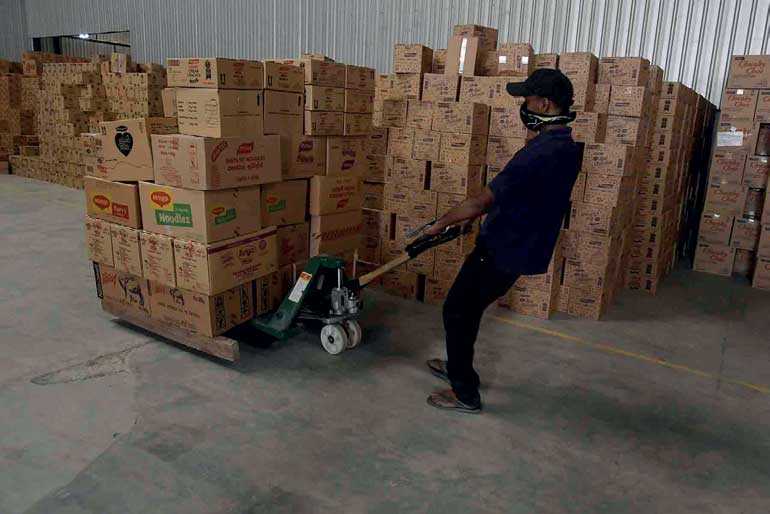Saturday Feb 21, 2026
Saturday Feb 21, 2026
Tuesday, 31 March 2020 00:00 - - {{hitsCtrl.values.hits}}

The COVID-19 pandemic does not differentiate based on race, religion, age, nationality, gender, political affiliation or lifestyle. The entire world is united in the fight against the pandemic. From a Sri Lankan perspective as well, we need to be united to mitigate the impact of this scenario – Pic by Shehan Gunasekara
It is evident that the COVID-19 pandemic would create a significant economic impact globally. Whilst it is rather premature to predict the overall impact, one can safely conclude that the impact will last for a number of months (best case scenario) post COVID-19. In Sri Lanka too we can expect our economy be impacted severely.
The tourism industry which currently employees around 600,000 people both directly and indirectly will be an industry which will be affected not only at present but post COVID-19 as well since tourists will probably not travel out of their home countries for a while at least. Similarly the tea and apparel industries in Sri Lanka will also suffer due to this pandemic as a result of reduction in consumer demand, supply chain issues and stringent cost reduction strategies by both customers and partners. No industry will be spared from this pandemic.
Out of the approximately eight million total employed population of the country around 1.5 million are daily wage earners and around 2.3 million are self-employed. Hence, people such as labourers, carpenters, lottery ticket sellers, street vendors, salon workers, and lunch packet vendors to name a few will definitely struggle in the short- to medium-term as result of this pandemic situation. 
Unfortunately this segment of the country is often ignored when it comes to various Government incentives and stimulus packages. One can argue that this time around it is not going to be ‘survival of the fittest’ but rather ‘survival of the most adaptable’.
Around 70% of the Sri Lankan economy is contributed by Small and Medium Enterprises (SMEs). Whenever there is a crisis it is the SME sector that is hit the most. Considering that we are just 12 months after the horrific Easter Sunday terror attacks, the COVID-19 pandemic is definitely a deadly and unwelcome blow for SMEs.
The purpose of this article is to provide SMEs in the country some practical aspects on how to re-look at their purpose, re-strategise and re-calibrate their businesses if they are to survive and weather the storm during these tough times.
For the purpose of this article, the focus would be only on the SME sector of the country. Exemplified below are five areas that Sri Lankan SMEs (even though applicable for larger organisations as well) should focus on in order to face the economic challenges during and post COVID-19.
1. Engage your employees
SME owners and decision makers need to ensure that everyone in the organisation stays calm and maintains focus. There is an information and news overload (including fake news) these days which can easily increase the level of fear and anxiety and bring about a sense of over-hyped uncertainty. Hence, there should be clear, consistent and open communication within the organisation.
The safety of everyone within the organisation should be paramount and non-negotiable. Helping them overcome temporary issues such as sourcing essential groceries for example can help them psychologically be prepared to work. Assuring job security (if possible) will also send a very strong positive message to the employees.
Due to the current lockdown the only option is to work from home. Ensure you equip everyone in the organisation with the necessary tools required to work from home effectively. Whilst larger organisations have their own platforms and tools, SMEs can use a number of free tools available like Slack, Zoom, Google Docs, Skype and Google Meet for example to communicate and collaborate within the organisation so that work and productivity is not impacted.
Similarly it is important to engage everyone in the organisation to share new ideas, possible strategies and provide feedback on how to navigate the business during these times. Some of the best ideas in any organisation come from internal resources and SME owners and decision makers need to encourage this more than ever before. Employees will naturally be more committed when they know that their ideas are appreciated and implemented.
Creating an environment which supports each other and ensures team work is absolutely essential in any crisis. Encouraging innovation and creativity will also help organisations derive new ways to grow their businesses and serve its customers better. Whilst these sound rather straightforward it is surprising to see how such basic aspects often get ignored during times of pressure and crisis.
2. Re-evaluate the business model
It is important that every organisation re-evaluates its business model based on the current and potential post COVID-19 future. There is a need to understand and look closely at the revenue sources, cost structure, value proposition, key partnerships and activities of the organisation, customer segments and channels based on the new developments.
There is a strong possibility that the world we will all embrace post COVID-19 will be a new and much different one. Change is inevitable and adaptability to these changes in a proactive manner will be the key for every SME. It is important to focus on value creation as this would be the differentiator between success and failure. Existing products or services may not have the same demand. Hence re-evaluating the business model and making the necessary changes to it has to be done on ASAP basis.
3. Financial management of the organisation
One of the biggest challenges during any crisis will be on how to effectively manage the finances of the organisation. Cash flow management will be the most critical aspect during these times. Identify possible ways to reduce costs throughout the organisation by closely examining every aspect of the business process. Leveraging the existing relationships with suppliers, partners and vendors should also be a priority.
Negotiating additional (extended) credit terms or collecting payments in advance (than usual if possible) will no doubt help the financial position. Avoid being tempted to revise prices without any rationale or basis since this will only hurt the business further in the long run. SMEs also need to do new budgets and forecasts based on worst case assumptions. This can be done using scenario planning techniques.
The adaptation of best practices in the industry and especially the ones implemented by large organisations will also be a helpful initiative for SMEs to replicate during these times. SMEs should not fear to ask support or guidance from a variety of sources. There is no room for ignorance or ego. Every type of genuine support should be welcomed with arms wide open.
4. Support your customers and stay close to them
It is important that SMEs engage and stay closer to their customers during these tough times. It is clear that your customers are also severely impacted by COVID-19. Now is the time to be flexible (revise any internal procedures if required) and come up with new solutions, ideas and ‘out-of-the-box’ thinking to support your customers.
Engaging customers, listening to them and getting their feedback should be the mantra more than ever before. Losing customers is more detrimental than losing revenue at the moment. SME organisations need to focus on Customer Relationship Management (CRM) during these times. If the company does not have a formal strategy in place for CRM at the moment they should work on one immediately. The good news is that there are a number of online resources available that are useful in this regard.
5. Leadership and renewed purpose
Various experts have argued that effective leadership is an essential aspect when navigating during tough times. SME owners and leaders need to have self-belief and inspire others. They need to exemplify resilience and ‘walk the talk’. During these times the image, ethics and decision making capabilities of leaders and organisations are tested to the core. Any myopic decision or unethical act will be remembered for a long time with often irreversible outcomes.
The reputational damage due to such narrow thinking can be lifetime. There is also a need to re-examine the purpose of an organisation and what it believes in. Creating positive impact is more important than profits. Tough times indeed call for tough decisions. The best leaders are able to mobilise everyone towards a common vision and exceed their individual potential. Hence, leadership will play an important role on how a SME will survive and mitigate the economic impact resulting from COVID-19.
It should be noted that there may be a number of other strategies or aspects that SMEs can use to mitigate the challenges associated with the COVID-19 pandemic. However, I believe that the five broad areas exemplified above will definitely be useful for SMEs if implemented with diligence and careful analysis of its strengths, weaknesses and strategic priorities.
The COVID-19 pandemic does not differentiate based on race, religion, age, nationality, gender, political affiliation or lifestyle. The entire world is united in the fight against the pandemic. From a Sri Lankan perspective as well, we need to be united to mitigate the impact of this scenario. There is no room to be myopic, selfish or narrow-minded. We all have a responsibility to help the authorities fight this deadly pandemic as one nation and to flatten the curve.